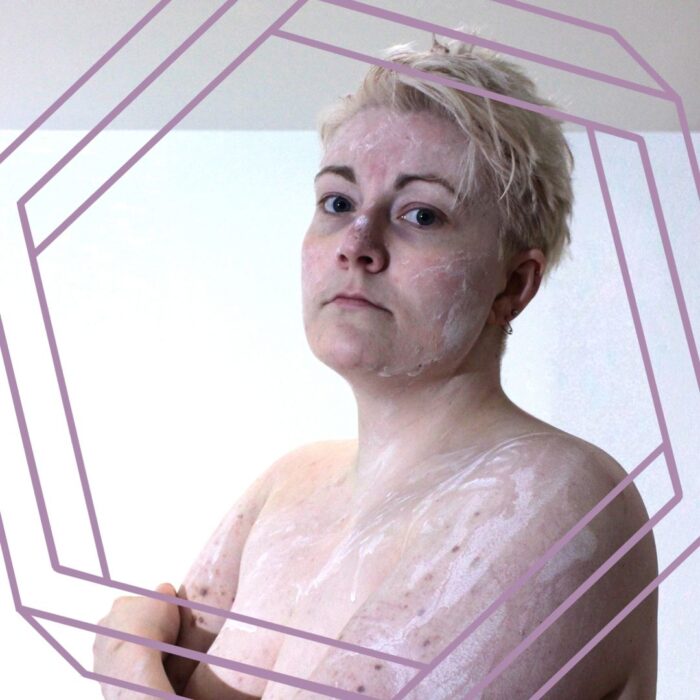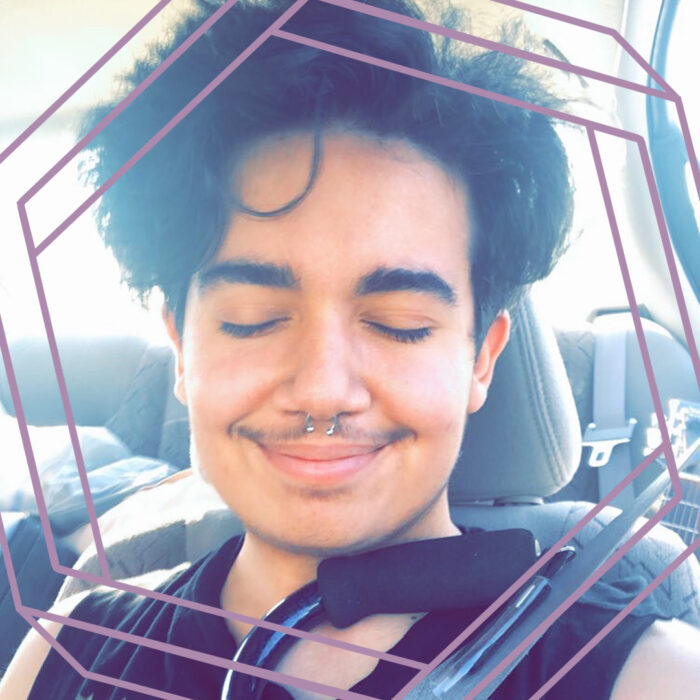75 – Alex
Description
 </figure>
</figure>Alex Haagaard talks narcolepsy, mast cells, and inclusive design.
Transcript
Brianne: I’m Brianne Benness, and this is No End In Sight, a podcast about life with chronic illness.
Drew: Hey, this is associate producer Drew Maar. Before we get started, here’s a quick reminder that you can find No End In Sight on patreon, which is a really simple way for listeners to subscribe to support the show financially on a monthly basis. So if you’ve been enjoying the podcast and you also have a couple bucks to spare, We’d be so so grateful if you’d sign up as a patron at patreon.com/noendinsight. Today we’ll be talking with Alex Haagaard about narcolepsy, mast cells, and inclusive design. A few content notes for this episode: There’s some COVID vaccine talk around 45 minutes in and lockdown comes up around 2 hours and 20 minutes in. There’s a mention of Vyvanse at around the hour mark, and a mention of cannabis around an hour and 45 minutes in. There are oblique references to suicidal ideation at around an hour 25 and an hour 35. And there’s a mildly graphic description of a bleeding time test an hour and 50 minutes in. Before we start, here’s our disclaimer: This podcast is not intended as a substitute for professional medical advice, diagnosis or treatment. Make sure you talk to your practitioner about any questions or symptoms.
[guitar riff]
Brianne: Okay. Well I like to start just by asking people, how was your health as a kid?
Alex: Oh. Oh God, that’s a complicated one. So yeah, I was a sickly little kid, and at the same time, my doctors and my parents really liked to reassure me that I was a healthy little kid. Never… never heard anyone talk about that before on the void.
Brianne: Very unusual.
Alex: Yeah, my whole health journey started when I was four, and my mum took me into urgent care, and they discovered that I had petechiae, which is like a pinprick kind of bruising that’s most normally associated with bleeding disorders. And they freaked out because for them it was like leukemia. That was their big association, and so that started me on the whole thing. And I didn’t have leukemia. I didn’t have AIDS. I didn’t have lupus. I didn’t have any of the other really scary things that they tested me for. So it eventually got sort of downgraded to idiopathic thrombocytopenic purpura and they just sort of left it there for another 20 years.
Brianne: Okay. Were you aware, at that age, that they were looking at… considering serious health stuff? Did that imprint?
Alex: It did because my mom does not handle stress or trauma well cause she’s… she’s got a lot of trauma. So yes, I was the emotional regulator for my parents. So yes, I was very aware of all of that and it was amazing. It was… it was honestly… it was weird cause I was aware, but I also don’t think it really like hit me because they ruled out the really scary stuff sort of within a span of three months. So there was sort of this period of very scary stuff, but the stuff that was most scary for me about that was the actual physical stuff that I experienced in the hospital, which we can get into cause that was a whole thing, too.
And then the prospect that I had something that was like fatal sort of dissipated over the course of about three to six months. And then I was left in the position where I was still like, “I’m in pain. I’m getting sick a lot.” And they were like, “No, you’re really actually very healthy.”
So it was this really weird relationship, I think in a weird way, like, because they’d ruled out that fatal stuff, that set me off on the whole relationship that I had to my health, which was not being able to tell whether I was healthy or not. Yeah.
Brianne: It’s hard cause like you say, when you’re that young, the context for so much of it is like, you can pick up the emotional cues of the people around you and interpret them however you interpret those things at that age, which is widely varied. Of course.
But like, you don’t know that like, or maybe you kind of know, but you don’t know what other kids are going through instead.. If you know that they’re not going through this, you’re like, “Okay, well maybe they do have weird bruising. It’s just not as serious.” The fact that it’s not…. it’s way more binary than that, frankly like…
Alex: Yeah. So much. And it is odd too. Cause there was like a little bit of context. Six months or a year before I was going through that whole thing, another kid in my class had been diagnosed with leukemia. So I remember sort of like… I had that context. And like also as a kid I didn’t see it all that much differently.
I remember the parents always being, like… talking about it and these like really sorrowful tones. And I was just like, “Oh, this is just the other kid in my class who’s sick.” And then I remember when I was like in fifth grade, there was another kid who had hemophilia. And I remember I was actually like kind of jealous of him because the grownups took him seriously, and I remember in a really fucked up way being kind of jealous of that.
Brianne: Yeah, it’s so weird. I’ve been thinking about this so much lately,
and I don’t know why, because I’ve known I had POTS for a while. But I’m still thinking about like old POTS memories, and like moments when I definitely was probably presyncopal, and I’m like… in environments where kids… If anyone had had a diagnosed condition, if they had been at that level of like about to lose consciousness, somebody would have intervened because somebody would have been watching for that all the time. As opposed to being like, “Oh, I’m not ready to keep up with the group,” or whatever it is in these social situations.
And you’re like, “I can tell that everyone is flagging me as disruptive.” I know there are many disability contexts where this applies, and right now I’m thinking specifically of that one, when you’re like, “Oh, I’m being weird. I look dramatic. I need to lie down.”
Alex: Oh my God. Yes.
Brianne: And people are like, “Kids… you shouldn’t need to lie down, get up.” And you’re like, “Okay. But that other kid who isn’t about to faint, but something serious is wrong with them… you recognize that they need to sit stuff out.”
Alex: Yeah.
Brianne: That’s really present for me right now.
Alex: Yeah, it’s a really weird feeling. You know, I talk a lot about how we distinguish between medically visible and medically invisible disability. And I mean, I think that foundation was laid, like as a kid, as I was seeing how differently adults responded to some of these illnesses and conditions. So there was literally this one time… I did swimming lessons. And whenever I had to have an endurance test, I’d get sick. That was like the, how you leveled out of whatever badge you were in. And they did the endurance test where you had to do like 20 or 40 laps within a certain amount of time, and I would always get sick. I’d always start wheezing. And then one time I like fully collapsed in the change room, and apparently I was like screaming about how I was dying and stuff. And like somehow not one of the adults in the change room was like, “Hey, maybe we should phone 911 or something.” I don’t know.
Brianne: Just like call a lifeguard.
Alex: They just sort of like stood around laughing, and like, eventually someone got my mom, and I like told her she had to take me to the toilet cause I was like incontinent by that point. And then I told her she had to get me into the shower and cool me off. Like I somehow knew this. I knew I needed to get cooler. And like looking back, I’m like, “Someone should have phoned an amulance. Why did no one phone an ambulance? What?”
Brianne: Like just, how did everybody interpret that scenario? I don’t know. I like, I fainted in public, more than once at this point too, and I’m just… it’s weird. It’s weird how people react, especially to like… everything that they think is going on in the circumstance and whether or not they think that you are somebody who needs help in that moment, because I feel like I’ve had both reactions.
Alex: Totally. Yeah. I’ve close to fainted once in public. And that was in high school, and this is the thing, I’ve never full on fainted, but I’ve gotten to the point where like I semi consciously laid down. Right? Like I still… I would consider that fainting because it was like, I laid down at the point where I knew if I didn’t lie down, I was going to hit my head. But like, technically I was still conscious cause I could hear things. And I remember it. This was in high school, and I was in the hall in the middle of lunch, and I sort of like crumple laid down on the floor. And I heard people stepping over me and being like, “Ooh, she’s really sick.” I mean like, “Okay. So







